| Punjab Government
Website on Hockey |
 he
National Informatics Centre (NIC) maintains the government website of each state
in India. In the Punjab Government's website, in the Culture and History
section, there is a special writeup on hockey.
They have given short biographies of 4 superstars of Punjab hockey,
excerpts of which we present below. The information contained is dated
sometime during 1992, before the Barcelona Olympics. he
National Informatics Centre (NIC) maintains the government website of each state
in India. In the Punjab Government's website, in the Culture and History
section, there is a special writeup on hockey.
They have given short biographies of 4 superstars of Punjab hockey,
excerpts of which we present below. The information contained is dated
sometime during 1992, before the Barcelona Olympics.
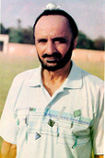 Sansarpur
village on the outskirts of Jalandhar is well-known for producing top
hockey players for India. One whose stickwork dazzled and fascinated a
legion of fans was Udham Singh. Sansarpur
village on the outskirts of Jalandhar is well-known for producing top
hockey players for India. One whose stickwork dazzled and fascinated a
legion of fans was Udham Singh.
After Leslie Claudius, he was the only Indian player to have donned
national colours in four successive Olympics. These were 1952 Helsinki
(under K. D. Singh Babu), 1956 Melbourne (under Balbir Singh Sr.), 1960
Rome (under Leslie Claudius) and 1964 Tokyo (under Charanjit Singh).
Udham Singh was known to be a versatile forward. He could play at
left-inside, right-inside, centre-forward or click at centre-half position
too.
His hockey career spanned from 1949 to 1964. During this period, he led
India thrice - first in 1953 when the Indian team went on a tour of Warsaw
(Poland), second during India's East African and European tours in 1959,
and for the last time in 1961 during the Australian and New Zealand tours.
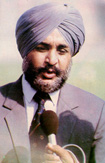 Ajit Pal Singh was rightly acclaimed as
"one of the best centre-halves in the world" during his time. He
led India to a sensational victory in the 3rd World Cup hockey tournament
at Kuala Lumpur in 1975. Ajit Pal Singh was rightly acclaimed as
"one of the best centre-halves in the world" during his time. He
led India to a sensational victory in the 3rd World Cup hockey tournament
at Kuala Lumpur in 1975.
Ajit Pal Singh showed such dexterity and skill at his position that he
was included in the World Hockey XI teams of 1971, 72 and 73. He next
represented India in the 1974 Asian Games at Teheran. Consequently, he was
included in the Asian All-Star Hockey XI the same year.
But he reached the pinnacle of glory in 1975 when he led India to the
third World Cup victory in Kuala Lumpur in the most trying circumstances. Punjab Government had borne all expenses prior to the participation by
organising a camp for the team in Punjab. The whole country was in great
jubilation. For the first time hockey seemed to get priority over cricket
in the country.
Ajit Pal Singh shared one common trait with the late Surjit Singh. He
always challenged the high-handedness of the IHF bosses who showed scant
respect for the boys who toiled in the field for the country's honour. At
present, he owns a Centre-Half filling station in Delhi.
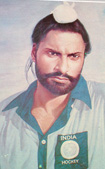 Opinion
may be divided among hockey fans as to who was the best deep defender
between Prithipal Singh and Surjit Singh. However, no one can deny
that both possessed extraordinary skill, sound tackling and fine recovery,
besides unleashing thunderbolts from the heavy blades of their sticks. Opinion
may be divided among hockey fans as to who was the best deep defender
between Prithipal Singh and Surjit Singh. However, no one can deny
that both possessed extraordinary skill, sound tackling and fine recovery,
besides unleashing thunderbolts from the heavy blades of their sticks.
Surjit Singh made his international debut in the second World Cup hockey
tournament in Amsterdam in 1973. He was a member of the Indian team which
won the third World Cup at Kuala Lumpur in 1975. He also participated in
the 5th World Cup in 1982, the 1974 and 1978 Asian Games, and the 1976 Olympics,
when Indian hockey nosedived.
Surjit Singh was acclaimed as one of the best full backs in the world.
In 1973 he was included in the World Hockey XI. Next year he was a member
of the Asian All-Star Hockey XI. Surjit Singh was also the top scorer in
both the Esanda International hockey tournament at Perth in Australia and the
1978 Asian Games.
Surjt Singh had major differences with Indian Hockey Federation bosses
over the raw deal given to hockey players. Like Bishan Singh Bedi in
cricket, Surjit always upheld the player's cause. He was pained to find hockey players
being treated like a 'herd of cattle'. Frustrated and
disillusioned, Surjit Singh hung his stick during the prime of his career.
After his retirement from the game, Surjit Singh
died in tragic circumstances in a road accident near Kartarpura in Jalandhar district, while
arranging to organise his benefit tie at Jalandhar.
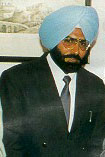 Attack
is the best form of defence, they say, and Pargat Singh was an
exponent of this art. He often carried the fight into the rival camp. Attack
is the best form of defence, they say, and Pargat Singh was an
exponent of this art. He often carried the fight into the rival camp.
In the Champions Trophy at Perth in Australia, India were trailing 1-5
against Germany with just six minutes to go, On that particular day, India
did not lose hope. One after another, India blasted three goals to make it
4-5. With only a few seconds to go, Pargat Singh collected the ball from
his own half and ran down the field. Dribbling and dodging, he tore apart
the German defence to score the tying goal.
Pargat Singh repeated the feat in the next Champions Trophy and gave
India a 3-2 victory over Holland.
Pargat Singh is the Vice-President of the Surjit Singh Memorial Hockey
Tournament Society.
|
| Rs. 1000 for Winning
the World Cup |
 he
memories of India winning the 1975 World Cup remains etched in the mind of
V. J. Philips. He, like the other members of the team, had tears in his
eyes. "I thought the Indian tricolour would touch the skies that
day." he
memories of India winning the 1975 World Cup remains etched in the mind of
V. J. Philips. He, like the other members of the team, had tears in his
eyes. "I thought the Indian tricolour would touch the skies that
day."
The nation rejoiced after the World Cup triumph, and Philips recollects
the traffic jam at the Marina Beach in Chennai as the team was taken
around the city in an open motorcade.
Philips had played his part in the World Cup by knocking in seven goals.
He created the match-winning strikes in both the semi-final and the final,
where India overcame arch-rival Pakistan in a high voltage duel.
What has this fine player of yore got back from the country he so
dearly loves? Nothing. Not even an Arjuna Puraskar. And despite assurances
from the Government, he still lives in a rented house in Chennai.
"The only reward I ever received from the Government was Rs. 1,000
from Chief Minister Mr. M. Karunanidhi, soon after we won the World Cup in
1975. That was all. I did not have any godfather to take up my case."
reveals Philips.
It makes one shudder. If Philips, a celebrated player in India's
national game, can be treated like this, imagine the plight of lesser men.
It's a national shame. We do not know how to recognise champions.
Philips is presently a Sports Officer with the Railways. He umpires
hockey matches in Chennai. On Sundays, Philips spends time with young boys
in St. Thomas Mount, teaching them the finer points of the game. It was
here that Philips himself learnt the game as he grew up, before honing his
dribbling skills under the eagle eyes of Udham Singh at NIS Patiala.
Philips comes from an era where money was very much secondary to the
game. Philips wants to contribute more to Indian hockey. "Don't give
me the senior team. But give me a junior or the sub-junior side and I will
show the results. I always look forward to working with the junior
players. They are our future."
As one gets up after the interview, Philips sports a warm smile that
comes straight out of the heart. He's a proud, plain-speaking man who
will not ask for anything. This doesn't mean the authorities concerned
should ignore him.
Let's learn to acknowledge our heroes.
Article Courtesy - S. Dinakar of The Hindu
|
| India's Match
Schedule in the Sydney Olympics |
 he
International Hockey Federation (FIH) released the draw for the men's
and women's hockey tournaments at the Sydney 2000 Olympic Games. The
competition will be held from September 16-30 at the State Hockey Centre
in Sydney Olympic Park. he
International Hockey Federation (FIH) released the draw for the men's
and women's hockey tournaments at the Sydney 2000 Olympic Games. The
competition will be held from September 16-30 at the State Hockey Centre
in Sydney Olympic Park.
India, which is in Pool B, has the following schedule:
| Match |
Date |
Time |
| India vs. South Africa |
Sun, Sep 17 |
10:30 am |
| India vs. Australia |
Tue, Sep 19 |
8:30 pm |
| India vs. South Korea |
Thu, Sep 21 |
8:30 am |
| India vs. Spain |
Sat, Sep 23 |
3:30 pm |
| India vs. Poland |
Tue, Sep 26 |
8:30 pm |
| Semi-Finals |
Thu, Sep 28 |
2 pm, 8 pm |
| FINAL |
Sat, Sep 30 |
8 pm |
India is clubbed with Australia,
Spain and South Korea, and would have to beat two of these three
countries to make the semi-finals. In the past decade, India has losing records
against all the above countries Argentina
is the first reserve team in case the South African hockey men's hockey
team is not allowed by its National Olympic Committee to participate in
the Sydney Olympics. In the run up to Sydney, India would play around 15
to 20 matches, including tests against Malaysia, Egypt, and Argentina. The
team for the Olympics is likely to announced by the second week of August,
and will train in Brisbane at least 3 weeks before the Games.
|
| No Money for
Boarding/Lodging |
 he month-long
training camp (May 18 - June 18) for the Sydney Olympics has begun at Bangalore - not
at the Sports Authority of India (SAI) ground but at the local state
hockey association ground. This is because the turf at SAI (South) is worn out and unfit
for play. he month-long
training camp (May 18 - June 18) for the Sydney Olympics has begun at Bangalore - not
at the Sports Authority of India (SAI) ground but at the local state
hockey association ground. This is because the turf at SAI (South) is worn out and unfit
for play.
The Indian team probables are staying at the clubhouse of the Karnataka
State Cricket Association (KSCA), whose charges for boarding/lodging are
Rs. 650 per person per day.
The KSCA clubhouse has not received any payment as
advance. "We have received an assurance from IHF chief K. P. S. Gill that
the payment will be made," said a clubhouse official.
The KSCA should be aware that 'assurances' do not make for legal
tender. The last time the hockey players
stayed away from SAI (in September 1999), they ran up a boarding/lodging bill of
Rs. 1.89 lakh. However, the hotel where the players stayed, Hotel Telehaus on K. H. Road,
got only Rs.
50,000 in compensation.
Telehaus' rates were Rs. 500 per person per
day, less than the cricket association's (KSCA) clubhouse rates of Rs. 650
per day. However, the SAI paid as per its camp norms of Rs. 168 per person
per day.
Telehaus owner and hockey enthusiast Col. Fredrick D'Sa said, "I am disgusted at the way I have been treated. I have met all the top
officials in the IHF. They have only made promises. But no payment has
been made so far. To think that I had offered to house the hockey team for
the love of the game."
|
| Women's Hockey
Federation on a Witch Hunt |
 e have
identified the enemy, and the enemy is within. That is the sorry fate of
Indian hockey. The women's federation has shown that it is no less than
the men's counterpart when it comes to victimising talented players. e have
identified the enemy, and the enemy is within. That is the sorry fate of
Indian hockey. The women's federation has shown that it is no less than
the men's counterpart when it comes to victimising talented players.
The issue at hand was the non-participation of four senior players -
Sita Gussain, Pritam Rani Siwach, Manjinder Kaur and Sandeep Kaur - in the
Olympic qualifying tournament at Milton Keynes, England, in March. India finished
last at the Qualifiers, and is out of the Sydney Olympics.
The Indian
Women's Hockey Federation (IWHF) formed a three-member committee to
look into the alleged boycott by the players. The committee comprised
Mrs. Mriduala Sinha of Bihar as chairperson, Ramesh Nambiar of Air India
and R. N. Chowdhury of the Railway Sports Promotion Board (RSPB).
The committee met the four players individually and collectively. The
committee members also gathered the views of several officials
independently, and was in possession of the report of the chief coach
Bhangu to the Sports Authority of India (SAI).
The committee's recommendations were as follows:
- 1-year suspension for the 4 players
- Dismissal of coach Bhangu and manager Ms. Rupa Saini
- Critical remarks on the working of IWHF and RSPB
The four dismissed players include 3 former India captains, one Arjuna Puraskar
winner, and the lone representative from Asia in the FIH World XI
team of 1999.
Sports officials in India are all of the same breed - from the gutter.
The short-sighted hockey officials who conspired to keep the Asiad Six out
of Indian hockey, are now ganging up on their women counterparts to banish
them into the wilderness.
In either case, it is Indian hockey that suffers.
|
| India
Disappoint in the Junior Asia Cup |
 he
11-nation 4th Junior Asia Cup was held at the National Hockey Stadium in
Bukit Jalil, from May 3 -
May 14. he
11-nation 4th Junior Asia Cup was held at the National Hockey Stadium in
Bukit Jalil, from May 3 -
May 14.
South Korea upset fancied India 3-2 in the final to win the Junior Asia
Cup. Malaysia finished third when they edged Japan 2-1. Only the top 3
teams qualified for next year's Junior World Cup. Match
reports of the 4th Junior Asia Cup (men) can be found here.
India thus continued its losing streak of never having won any Asia Cup
title - whether senior or junior, men's or women's. In contrast, Asian
hockey powerhouse Korea currently holds all 4 titles at stake in the Asia
Cup.
7 Indian players made it to the Junior Asia Cup All-Star team -
forwards Deepak Thakur, Gagan Ajit Singh and Prabhjot Singh, midfielders
Bipin Fernandez and Arjun Halappa, and backs Lazarus Barla and Len Ayyappa.
China's Song Yi emerged as the tournament's top scorer with 21
goals. Korea's in-form goalkeeper Lee Myung-Ho was selected as the
Player of the Final. 15-year old Prabodh Tirkey of India was given
a special prize as the Most Promising Player of the tournament.
The Indian junior team, the nucleus of which was formed in 1998 under
C. R. Kumar, has not won any of the tournaments it has participated in. It
came 2nd in the 8-nation Junior Challenge in Poznan (August 1999), 3rd in
the 4-nation tournament in Cairo (February 2000) and now 2nd in the Junior
Asia Cup in Kuala Lumpur.
It was a disastrous Junior Asia Cup for Pakistan, who had won the 3
previous editions. Pakistan could not even reach the semi-finals of the
event, as they lost on consecutive days to Korea and Malaysia. Barring
some backdoor politicking, Pakistan has, for the first time ever, failed to
qualify for Junior World Cup.
In parallel, the 8-nation 3rd Junior Women's Asia Cup was also held from May 6 -
May 13 at Kuala Lumpur. India came third in the tournament, beating
Japan 3-1. Favourites South Korea won their 3rd consecutive Junior Asia Cup
title, defeating China in the final. Korea had won the earlier two
editions held in 1992 and 1996.
Mamata Kharab was voted the Player of the Tournament. She was the top
scorer of the tournament with 9 goals, a feat she shared with Numao Mie
of Japan.
Match reports of the 3rd Junior Asia Cup (women) can be found here.
|
| India's
Oldest Sports Goods Company |
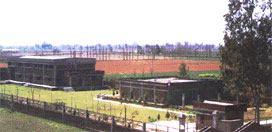
Hans Raj Mahajan and Sons, Jalandhar
 ans Raj Mahajan
and Sons (HRM), established in 1925, is India's oldest sports goods company. HRM
was the official and exclusive supplier to the Indian contingent for six
consecutive Olympics Games between 1960 and 1980. The Indian teams for the
Rome (1960), Tokyo (1964), Mexico City (1968), Munich (1972), Montreal
(1976) and Moscow (1980) Olympics were kitted and equipped
by HRM. ans Raj Mahajan
and Sons (HRM), established in 1925, is India's oldest sports goods company. HRM
was the official and exclusive supplier to the Indian contingent for six
consecutive Olympics Games between 1960 and 1980. The Indian teams for the
Rome (1960), Tokyo (1964), Mexico City (1968), Munich (1972), Montreal
(1976) and Moscow (1980) Olympics were kitted and equipped
by HRM.
Based in Jalandhar, Punjab, HRM is presently exporting to more than 35
different countries in all the six continents. Their product range
includes sports equipment & accessories for boxing, cricket, football,
hockey and other sports. Their clients include Dita, Dunlop, Slazenger, Wembley Stadium
and the well known Manchester United football club.
HRM has 2 manufacturing units in an area of 75,000 square feet, with
complete in-house facilities for designing, R&D and product testing
(refer photograph above). Their website URL is http://www.hans-raj.com.
They can be reached via email at query@hans-raj.com.
Hans Raj Mahajan and Sons is a member of The Sports Goods Federation of
India (SGFI).
|
| Cedric Visits the
AIS in Australia |

The Australian Institute of Sport, Perth
 he
bi-weekly columns of former coach Cedric D'Souza for Rediff
are worth reading. Cedric's latest article was based on his visit to
Australia, where he met with present Australian national coaches Terry
Walsh and Ric Charlesworth, as well former national coaches Frank Murray
and Richard Aggiss. he
bi-weekly columns of former coach Cedric D'Souza for Rediff
are worth reading. Cedric's latest article was based on his visit to
Australia, where he met with present Australian national coaches Terry
Walsh and Ric Charlesworth, as well former national coaches Frank Murray
and Richard Aggiss.
In the article, entitled Lessons Down Under, Cedric has the
following observations on the Australian Institute of Sports (AIS), Perth.
The AIS has 8 regional Intensive Training Centers (ITC) around
Australia. Each of the ITCs have 36 players - 20 play in the national league, with
16 additional players waiting in readiness. The players are in the age
groups of 14 to 20.
All the centers have a uniform coaching format developed by the
national coach, with the regional coaches given some flexibility to be
creative and improvise. The regional coaches spot talent and recommend to the AIS in Perth.
Once selected, the trainees get paid, specialized training, subsidized by
government funding (currently a stipend of $5000, based on Australia's 4th
place finish in the Utrecht World Cup).
The astroturf pitches at Perth (home of the 2002 Women's World Cup) are
booked throughout the day, with at least six different levels of sport -
grassroots development, juniors, seniors, clubs, national and veterans.
For Cedric, the lesson to be learnt was that by raising their domestic
levels, Australia has been able to establish themselves on the
international stage.
What do the Australian coaches think of the Indian system? They felt
that our coaching standards are pathetic, our administration is way behind
the rest of the world and there's too much politics in the selection of
teams.
Without any structure in place and a reluctance to change with the
times, they felt it will always be an uphill task for India. They
could not believe that coaches in India are not paid and do not have a
signed contract. They felt that India needed to get fitter both mentally
and physically, tighten up in defense, and get more tactical in their
overall approach to the game.
As Cedric says in his closing remarks:
"A great amount of thought has gone into structuring the
sport in Australia. We must take a leaf out of that book. I do not say
that we blindly copy what they have, but at least we can steal some
points from them and form a base. It will provide India a system it so
desperately needs, and make uniformity the order of the day. This done,
I am convinced, Indian hockey will once again steal the thunder.
|
| Dhanraj Back From
Germany |
 ormer
India captain Dhanraj Pillai took a break from the German Bundesliga to
join the Indian hockey camp at Bangalore. After the first leg of the
training camp (May 18 - June 18), Dhanraj will return to Germany to play
for his club Stuttgart Kickers. The club is scheduled to tour Switzerland
for a tournament next month. ormer
India captain Dhanraj Pillai took a break from the German Bundesliga to
join the Indian hockey camp at Bangalore. After the first leg of the
training camp (May 18 - June 18), Dhanraj will return to Germany to play
for his club Stuttgart Kickers. The club is scheduled to tour Switzerland
for a tournament next month.
Dhanraj will return to India for the second leg of the training camp
(July 15 - September 1), and join the German club again in October after
the Sydney Olympics.
"It was a very good experience," the captain of the Asian
Games gold medal winning team said of his stint in Germany. "The
clubs whom we played against had a few national team players. I played
against German captain Christian Mayerhoffer, forward Oliver Domke and
goalkeeper Nils."
Dhanraj was also exposed to some effective training techniques. The
method of preparation prior to every match, which included video sessions
on each rival player, as well as the approach towards the game, was very
educative said the star forward.
Stuttgart Kickers were placed fourth in the league, the intensity of
the competition making their chances of a better placing difficult said
the former Indian captain.
It is to be hoped that after Sydney, many more Indian Olympians get to
play in the financially and professionally rewarding hockey leagues of
Europe.
|
| Border
Security Force Win Guru Teg Bahadur Cup |

Photo Courtesy - The
Hindu
 he
6th Guru Tegh Bahadur Gold Cup took place at the Mahindra stadium in
Mumbai from April 27 to May 5. he
6th Guru Tegh Bahadur Gold Cup took place at the Mahindra stadium in
Mumbai from April 27 to May 5.
Teams that took part in this All India tournament were local favourites
Bharat Petroleum Corporation Ltd. (BPCL) and Air India (AI), a junior team
BHA Colts, and outstation teams like Indian Airlines (IA) from Delhi and
Sikh Regimental Centre (SRC) from Ramgarh.
The organizers decided not to invite Punjab Police due to their
tantrums, both on and off the field. That left only one team from Punjab
in the tournament - a new look Border Security Force (BSF) team that
featured more players from the the tribal belt of Orissa and Bihar than
from its traditional stronghold of Punjab.
The match results were as follows:
| Stage |
Date |
BSF |
BPCL |
| Quarter-Finals |
May 2 |
beat BHA Colts 1-0 |
beat SRC 1-0 |
| Semi-Finals |
May 3 |
beat IA XI 2-1 |
|
| |
May 4 |
|
beat AI 8-7 (tie-breaker) |
| FINAL |
May 5 |
beat BPCL 2-0 |
In the final, Merinus Lakra put BSF ahead 1-0 six minutes before the break,
and then Shinu Herenz clinched the final with a rasping shot five minutes
from time.
The winners received a cash award of Rs. 40,000, while BPCL picked up
Rs. 20,000. The Sports Journalists Association of Mumbai Award of Rs 5,000
and a silver trophy for the Player of the Tournament was bagged by BPCL
and junior India goalkeeper P. A. Bopanna.
|
| Tailpiece |
 he inaugural
Afro-Asian Games will be held from November 3 - November 11, 2001, in New
Delhi. The athletes from the two continents will be competing in a total
of 8 disciplines - athletics, boxing, football, hockey, shooting, swimming,
tennis and weightlifting. Hockey would be represented by both men's and
women's competitions. All athletes (and officials) will be given free air
travel, lodging and boarding facilities during the Afro-Asian Games. he inaugural
Afro-Asian Games will be held from November 3 - November 11, 2001, in New
Delhi. The athletes from the two continents will be competing in a total
of 8 disciplines - athletics, boxing, football, hockey, shooting, swimming,
tennis and weightlifting. Hockey would be represented by both men's and
women's competitions. All athletes (and officials) will be given free air
travel, lodging and boarding facilities during the Afro-Asian Games.
This was announced by the Afro-Asian Games Council (AAGC) and Indian
Olympic Committee secretary general Randhir Singh at the International
Olympic Committee (IOC) meeting in Rio de Janeiro on May 23. The AAGC
meeting was also attended by IOC president Juan Antonio Samaranch and
union sports minister Sukhdev Singh Dhindsa.
The Olympics, Asian Games, Commonwealth Games and the Afro-Asian Games
will be the 4 IOC sanctioned events that the Indian hockey team would be
participating in, every 4 years.
|
![]()